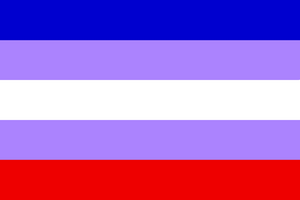Autopedophilia: Difference between revisions
Created page with "thumb|right|The autopedophilia flag '''Autopedophilia''' is an attraction to the idea of being a child. It can take form being attracted to the image of oneself as a child or to the idea of becoming the child in child/adult relationships. == History == This term was coined by Anne A Lawrence in ''Clinical and theoretical parallels between desire for limb amputation and gender identity disorder'' in 2006<ref>[https://pubmed.ncbi.nlm.nih.gov..." |
mNo edit summary |
||
| (One intermediate revision by the same user not shown) | |||
| Line 15: | Line 15: | ||
== References == | == References == | ||
[[Category:Original pages]] | |||
[[Category:English]] | |||
Latest revision as of 02:14, 7 May 2024

Autopedophilia is an attraction to the idea of being a child. It can take form being attracted to the image of oneself as a child or to the idea of becoming the child in child/adult relationships.
History
This term was coined by Anne A Lawrence in Clinical and theoretical parallels between desire for limb amputation and gender identity disorder in 2006[1]. She remarks that Kurt Freund and Ray Blanchard have described this phenomenon in Erotic Target Location Errors in Male Gender Dysphorics, Paedophiles, and Fetishists[2], but did not name it.
Other terminology
Autopedophilia was primarily studied with help of map research participants (according to one study, 49.1% of surveyed pedophiles and hebephiles were autopedophilic[3]), so it shared some of the stigma, and non-maps weren't eager to adopt this term. Instead they called themselves littles or ageplayers, which are close, but not necessarily similar concepts.
Nowadays words "autonepiophilia", "autohebephilia", "autoephebophilia" are used in the map community for extra precision. The umbrella term "automap" was coined by Pawkips on October 14, 2021[4]. However, in popular psychology all these concepts are still grouped under "autopedophilia".
It is important to note that autopedophilia should not be mistaken for being transage (identifying as another age, not necessarily younger).
References
- ↑ Lawrence A. A. (2006). Clinical and theoretical parallels between desire for limb amputation and gender identity disorder. Archives of sexual behavior, 35(3), 263–278. https://doi.org/10.1007/s10508-006-9026-6.
- ↑ Freund, K., & Blanchard, R. (1993). Erotic target location errors in male gender dysphorics, paedophiles, and fetishists. The British Journal of Psychiatry, 162, 558–563. https://doi.org/10.1192/bjp.162.4.558.
- ↑ Here’s a Weird New Discovery About Pedophiles, Jesse Singal, The Cut.
- ↑ Auto-MAP, Queerpedia via Wayback Machine.
